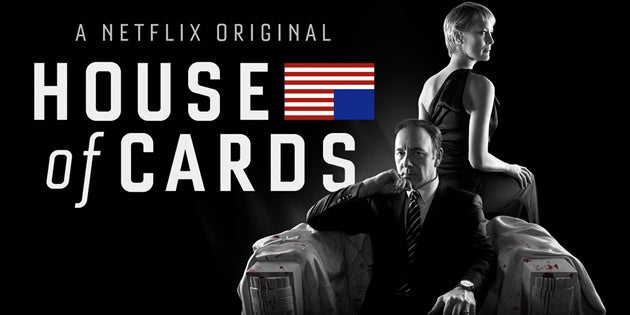House of Cards, the first original series from Netflix, premieres its third season today, February 27,  2015, on the streaming media provider’s website. The season opens to mixed reviews, citing its slow start but exciting mid-season as well as its lead actors (Kevin Spacey and Robin Wright) for their portrayals of weighty characters Frank and Claire Underwood.
2015, on the streaming media provider’s website. The season opens to mixed reviews, citing its slow start but exciting mid-season as well as its lead actors (Kevin Spacey and Robin Wright) for their portrayals of weighty characters Frank and Claire Underwood.
The series, which was adapted from a 1990 British miniseries of the same name, gained critical acclaim in 2013 for its highly dramatized representation of Capitol Hill behind closed doors. But political science professor Jordan Ragusa contends that the real action in Washington, D.C. looks nothing like the dark and gritty version presented by House of Cards.
“First, despite the conventional wisdom, members of Congress are typically highly educated and quite astute politically. I don’t think a single member of Congress – even the majority whip – can be that influential in bending fellow lawmakers to his will,” Ragusa says, “Second, Kevin Spacey’s character is over-the-top in his game theoretic strategizing. Yes, members of Congress are strategic. But Frank Underwood is just too Machiavellian for my taste.”
READ: More about the political fact and fiction behind House of Cards
Whether audiences believe political science expert Ragusa or they buy into the show’s sinister account of Washington, D.C., they can agree that it’s highly addictive to watch, especially when all episodes are made immediately available.
Communication professor Ryan Milner offers his opinion on the addictive nature of watching entire series. Netflix, which spearheaded the binge-watching trend that’s still rising more than two years after House of Cards was released, allows viewing to become a more social experience – for example, he says, “We can get caught up on Breaking Bad after season four because all our friends love Breaking Bad, and then we can watch season five live with them. When everyone we know is digging Game of Thrones or House of Cards, we can be a part of the conversation because we’ve got access to the catalog.”
Anthropology professor Hector Quirko agrees that there is something social about the binge-watching phenomenon. He argues that the experience is still unique and engrossing enough that it’s special. “Consumers want to be more and more in charge of when and how [they watch programs], as well as to control, if not avoid, commercials,” he says.
READ: More about Netflix bingeing: Why you can’t stop watching.
Regardless of the reason behind the success of binge-watching, one thing is for sure: people will be doing a lot of it this weekend. According to Cinema Blend, 670,000 people watched season two of House of Cards in its entirety during the weekend of its release, February 14, 2014. If history is any indicator, office water coolers across the U.S. will be surrounded by chatter of the Underwoods’ latest schemes come Monday.






